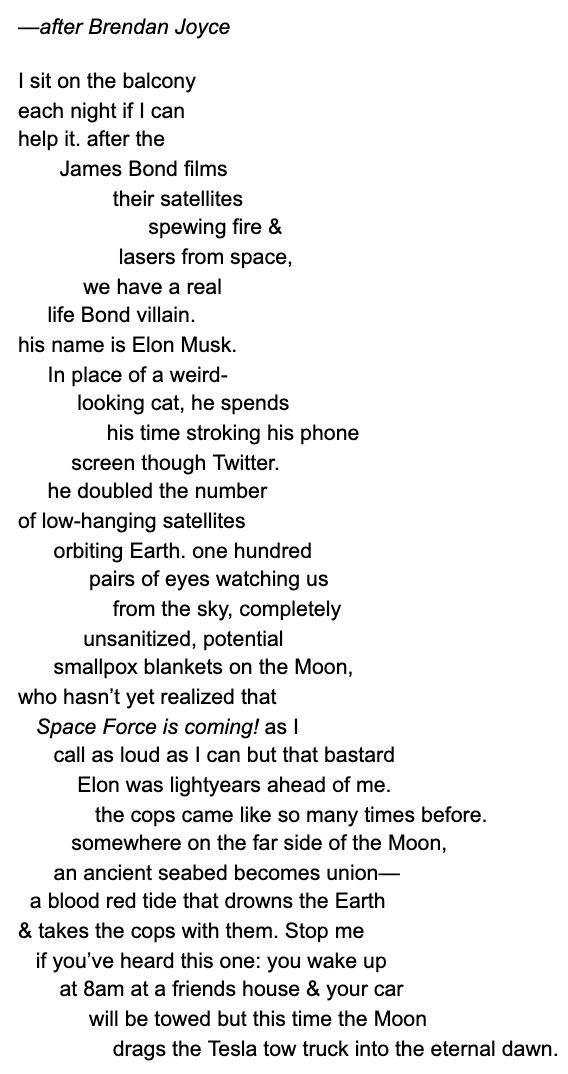In lieu of having a fully comprehensive plan for where marlskarx is going from here i’ll just say: it won’t be continuing for much longer, not in the way its been run.
I’m very thankful to the comrades who have helped me come to the conclusion not to shut things down but to utterly reassess everything. fundamentally, the (anti)press is not new, there have always been small presses that oppose liberal hegemony in publishing. But the (anti)press has done nothing but reproduce these structures it has claimed to oppose. The anti-press was helpful in beginning to organize poets around a leftist framework, until it was noticed that there was no coherent ideological structure supporting the whole.
marlskarx made a crucial error in its aim as a “publisher of the queer left,” as if this is a grounded position of some sort. left and queer being too broad of terms around which to organize.
I’m very thankful for the poets who decided to publish with me because it meant that we had, at some level, ideological overlap, but these labels are too disparate to constitute actual principles of revolutionary literature.
Piotr K. Gwiazda: “poets are acutely aware of the limits of their own ability to oppose the actions of their government or to challenge the economic structures that they themselves, as poets, to some degree help perpetuate. No matter how skillfully and eloquently they express their protest against the status quo, they can do very little, as poets, to change the status quo” (19).
And Lu Xun: “I suppose writers in this revolutionary place like to claim that literature plays a big part in revolution and can be used, for instance, to propagandize, encourage…, and accomplish revolution.” “For revolution we need revolutionaries, revolutionary literature can wait, for only when revolutionaries start writing can there be revolutionary literature”
So the question, I think, largely becomes: what the fuck is the point of shit like marlskarx. What role can it play in actual revolution. Publishing poets who may otherwise not be published, while admirable, is not inherently revolutionary, for the structures we sought to destroy are only re-encoded in liberal fashion.
It’s unpopular to say things like this because you want your poetry to matter in a revolutionary sense, and i think it can, but there is organizing that needs to take priority at the moment. In Lu Xun’s formulation there is first a literature of complaint, then silence and action.
As Juliana Spahr put it “when literature is instrumentalized by the government as the good form of protest and then used to suppress more militant dissent, it is not autonomous,” that literature always has market pressures, whether from the market or patrons (or patreon) (16-17).
Gwiazda and Bonney both invoke Baraka as using poetry to attempt to promote revolution by verbal means, and Gwiazda goes further and says that the belief that poetic expression will help bring about large scale social & political change through “bearing witness to the suffering” that “poetry can be political inspiration" while “an enabling mythmaking… it is not political activism” (86).
And again, this is not to say poetry doesn’t have a place in the revolution; I do think poetry has the capacity to help raise revolutionary consciousness, but that this can only be achieved through militant poetics.
Poems as a means through which to understand the moment, the way capital occupies that moment; documents showing us where and when to strike (Nealon 25; Bonney 65). Anyway, this has moved outside its original goal.
I have a paper on Bonney I’ve been writing that more articulately (maybe) covers these points in greater detail, which I’d be happy to send you, but this is just to say: marlskarx was an attempt to move in this direction and it, in its current state, failed.
Further analysis and organization will help render the definite future for marlskarx. I’ll continue going with the next few scheduled publications unless you’d like to withdraw, and its reconstitution will be more principled and grounded in a stronger organization.
____________________________________________
Works Cited
Sean Bonney
— Happiness
Piotr K. Gwiazda US Poetry in the Age of Empire 1979 - 2012
Juliana Spahr
— Du Bois’s Telegram: Literary Resistance and State Containment
Lu Xun
— Literature and Revolution
Lu Xun
— Literature of a Revolutionary Period (https://www.marxists.org/archive/lu-xun/1927/04/08.htm)
Christopher Nealon — The Matter of Capital: Poetry and Crisis in the American Century


